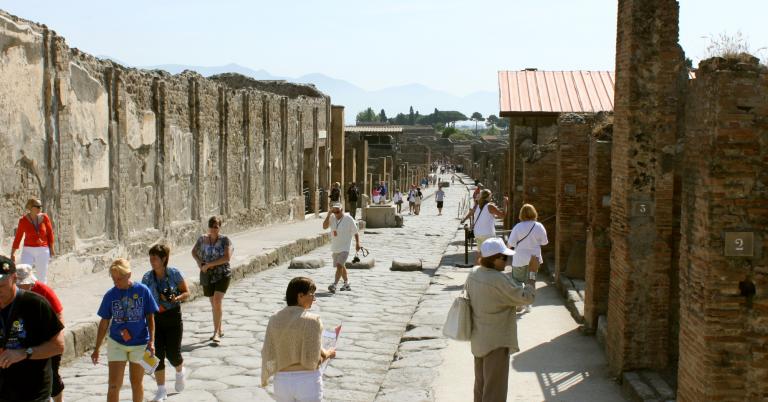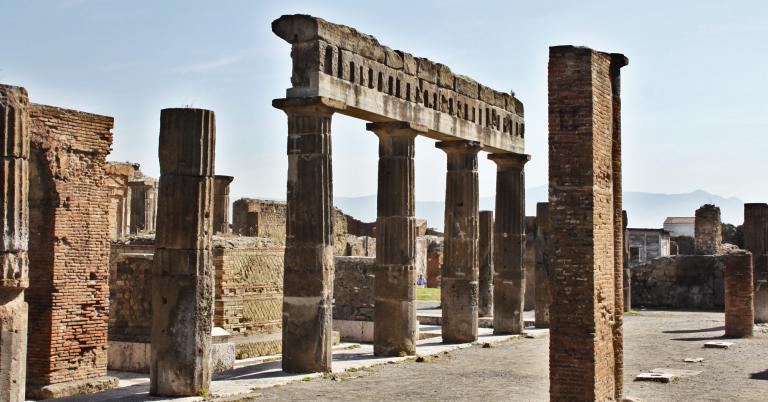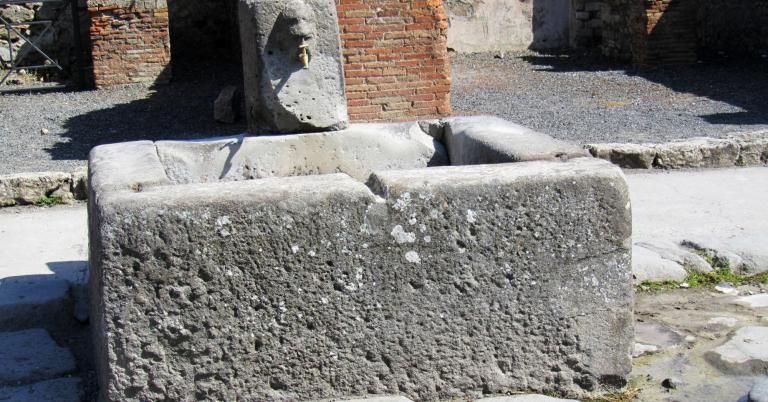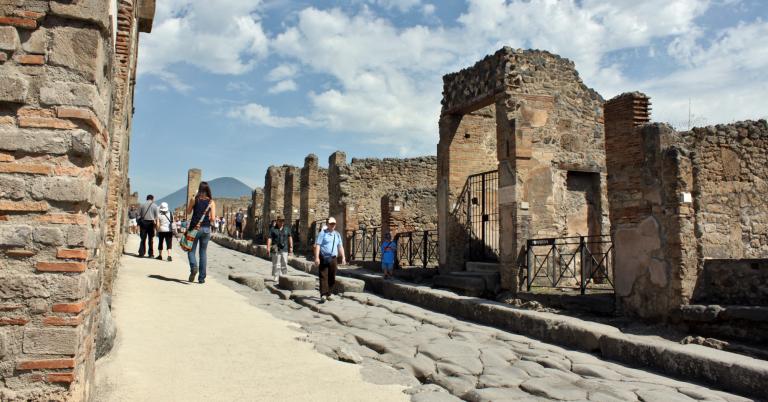Last week several of my Facebook friends shared this short piece from The Guardian about a Canadian woman who stole artifacts from Pompeii in 2005 and finally returned them. She included a note saying “please, take them back, they bring bad luck.”
According the article, she “blamed the theft for a run of misfortune that she had suffered in the years since, including having breast cancer twice and experiencing financial hardship.”
I’m sure most of you are shaking your head right now. What did she expect? How many stories like this do you have to read and hear before you figure out that stealing ancient artifacts isn’t just unethical, it’s personally dangerous?
I’m also sure some of you are shaking your head with skepticism. Many people take things they have no right to take – of course some of them have a run of bad luck. We never hear about the ones who suffer no ill effects.
This is true. But we also never hear from the people who take things from sacred sites, suffer the consequences, and then never connect the dots because they’re stuck in a materialist mindset.

I’m concerned about viewing misfortune as punishment. Taken too far, this blames the sick for their illnesses, blames the poor for being poor, and ignores both the randomness of life and the human-built systems that create and perpetuate suffering.
At the same time, cause and effect is as true in the spirit world as it is in the material world. And whether we suffer repercussions or not, we have an ethical obligation to be good guests when we travel, whether to ancient sites like Pompeii or to a neighborhood park. The land, the spirits of the place, and the various persons we visit – human and otherwise – deserve our respect.
Introduce yourself
One of the core principles of animism is that personhood extends to far more than just humans. It includes all living beings, which include many places and entities we usually think of as inanimate. When you go to a new place you aren’t simply changing spots on some lifeless game board. You’re encountering persons you haven’t met before – and you’re walking into their home.
So be polite. At the least, this means introducing yourself. Acknowledge the land and the spirits of the land. Acknowledge the persons who are already there, human and otherwise. Say who you are and why you’re there.

Make introductory offerings – carefully
Actions mean more than words. Introduce yourself, and then make offerings.
But take great care as to what you leave. I’ve seen too many sacred sites that look like a garbage dump.
Most times I pour liquid offerings – usually that means sharing the water I’m carrying to drink. Many (though not all) spirits like offerings of alcohol, but that can be damaging or fatal to this-world animals and plants. Food offerings may attract animals that are unwelcome at the site. And never – ever – leave something that’s not biodegradable. This post by Morgan Daimler discusses how people damage and sometimes kill trees by tying plastic ribbons on them.
Think about what the land and local spirits need and want, not just about what you want to do. If in doubt, simply offer clean water. If necessary, wait till you get to a place where pouring water is appropriate.
Listen – and pay attention
Part of being a good guest is listening to your host. Don’t just introduce yourself, spend a few moments in meditation and listen for the local spirits.
Honestly, most times I don’t hear much. The spirits have their own things to do and entertaining tourists isn’t always high on their priority lists. Though sometimes I’ve been welcomed warmly (by both living humans and other spirits) as with my first trip to Anglesey.
And a few times it’s been quite clear I wasn’t welcome.
Over time, consistent action will show that you’re someone who can be trusted – or that you’re someone who can’t. If you feel unwelcome in a local place, you may want to try again. The spirits in my back yard were quite ambivalent about me when I moved in. Over time, we’ve gotten to know each other rather well.
But if there are places you’re clearly told not to go, don’t go there. Respect the land and the spirits of the land – and engage in a little self-preservation. Not every place is for everyone.

Don’t take stuff – just don’t
You wouldn’t walk into a friend’s house and take a picture off their wall. You wouldn’t steal their silverware. You wouldn’t even take a loose penny you found on the bathroom floor.
So why would you think it’s OK to take a rock or a feather, much less something of historical or cultural value?
I find it interesting that the article described the artifact as “cursed.” Now, some objects and places are cursed, or they’re so filled with traumatic energy that their presence has a negative impact on humans. But most times objects like these aren’t cursed – they’re just not happy being removed from their home.
And they respond accordingly.
What if something calls to you? What if you ask permission? There are exceptions to every rule. But before you break this one, ask yourself if you’re really that good at hearing local spirits. Can you discern unfamiliar voices from your own wants – with certainty?
And then remember that in most cases, removing items from natural and historical sites is illegal and can result in fines or jail time.
Or a string of bad luck that just won’t end.
Do take pictures… most of the time
I know – you want something to help you remember your experience at the place. Memories are great, but memories are fallible, and they tend to fade over time.
That’s what cameras are for.
Even in the best of times I can only travel a couple weeks out of the year. But I can go back through my pictures and relive the experiences at any time. I visited Pompeii in 2012, but looking at these pictures it feels like it was last month… and I’m reminded that I need to go back. One morning wasn’t nearly enough.
Some years ago I explored the question of when you should and shouldn’t take pictures in a post titled Photography and the Sacred. Occasionally I’ve picked up my camera and heard “not here.” I try to pay attention to those warnings. And there are other places where photography is not allowed, for a variety of reasons. Don’t be a rude visitor.
But if you want to take something, take pictures.

Support local people
Instead of taking something, buy something.
Yes, Pagans are supposed to be anti-consumerist. But when you buy something from a local store or artist, you help support the people who live there.
For better or worse, tourism is an industry – an industry that’s really hurting right now. If you’re going to spend all the money on transportation and lodging and such, spend a little more and help the people who live where you’re visiting pay their bills.
Support returning stolen and looted artifacts
World War II has been over for 75 years, but we still occasionally get reports of artwork stolen by the Nazis turning up somewhere. We cheer when it’s returned to the place where it rightfully belongs.
And then we don’t think about sacred items – including human bodies – from around the world that are kept in Western museums.
This can be a complicated issue. I explored it in greater depth after I visited the British Museum in 2016 in a post titled Not Everything Belongs in a Museum.
Indiana Jones and Lara Croft are bad role models and most museums are better than that these days. Some artifacts have been returned to their home countries, but far from all. We need to have greater respect for the dead. Objects that are or were considered sacred by their cultures should be returned to them.
Be a good guest
Whether you’re traveling to an ancient site halfway around the world or to a city park halfway around the block, remember that you’re going into someone else’s home. Trees, birds, and rocks aren’t things, they’re persons. Leave them where they are.
Items of cultural and historical significance belong to the peoples who created them, and beyond that to the world at large. They don’t belong to visitors who happen to find them and assume no one will notice they’re gone.
Taking them is illegal… and dangerous.
Instead, be a good guest. Introduce yourself and make offerings. Listen, and pay attention. Take pictures, unless you can’t. Support the local people while you’re there. And after you return and realize some folks haven’t been so hospitable, do what you can to make things right.
















